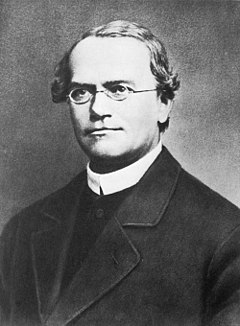After More than 160 years after Gregor Mendel’s foundational experiments with pea plants, scientists have finally identified the genes responsible for the last three traits Mendel studied but never genetically explained. Mendel, considered the father of genetics, analyzed seven traits in pea plants, but the genes behind flower branching, pod color, and pod shape had remained elusive — until now.
Showing posts with label Gregor Mendel. Show all posts
Showing posts with label Gregor Mendel. Show all posts
Wednesday, April 23, 2025
Friday, December 7, 2018
Why Do Some Finches Have Large Beaks While Others Have Small Ones?
 Cameroonian finches have always had either a large beak size, or smaller beaks. This had always been thought to be due to a difference in how hard the seeds they eat, much like the theory of Darwin's finches. However, birder and biologist Tom Smith, investigated this further by establishing a breeding colony of these finches. Based on the results, the trait seemed to be due to Mendelian genetics, and the larger beak was the dominant trait, with a 3:1 ratio of large to small beaks. This was the stepping stone to figuring out which genes affected this trait, and with the help of Bridgett vonHoldt, Princeton biologist, the question was solved. She found a stretch of DNA with 300,000 base pairs that always seemed to vary between the large and small-beaked finches, with the gene IFG-1 in the center. This gene is a growth-factor gene. vonHoldt said that this is a gene she has studied in canines as well and that if it is changed how it is expressed, a normal-sized dog could be changed into a dwarf-sized dog. This being said, not only can he gene affect the whole animal, but a specific trait as well, which is present in the case of the finches and their beak size. This all depends on where the gene is located on the genome and where it gets expressed, says vonHoldt.
Cameroonian finches have always had either a large beak size, or smaller beaks. This had always been thought to be due to a difference in how hard the seeds they eat, much like the theory of Darwin's finches. However, birder and biologist Tom Smith, investigated this further by establishing a breeding colony of these finches. Based on the results, the trait seemed to be due to Mendelian genetics, and the larger beak was the dominant trait, with a 3:1 ratio of large to small beaks. This was the stepping stone to figuring out which genes affected this trait, and with the help of Bridgett vonHoldt, Princeton biologist, the question was solved. She found a stretch of DNA with 300,000 base pairs that always seemed to vary between the large and small-beaked finches, with the gene IFG-1 in the center. This gene is a growth-factor gene. vonHoldt said that this is a gene she has studied in canines as well and that if it is changed how it is expressed, a normal-sized dog could be changed into a dwarf-sized dog. This being said, not only can he gene affect the whole animal, but a specific trait as well, which is present in the case of the finches and their beak size. This all depends on where the gene is located on the genome and where it gets expressed, says vonHoldt. https://www.sciencedaily.com/releases/2018/11/181119064118.htm
https://www.princeton.edu/news/2018/11/19/princeton-geneticist-solves-long-standing-finch-beak-mystery
Labels:
Darwin's Finches,
finches,
genes,
Gregor Mendel,
growth factor
Saturday, October 27, 2018
What inspired Mendel?
Everyone knows Gregor Mendel as the father of genetics, but what to we really know about the man himself? There are not many letters that he wrote himself available for reading, and only a few of his letters to Charles Darwin have survived. Mendel's "intentions in studying plants" has been a long anticipated question. In a recent article in GENETICS, by Peter J. van Dijk et. al, two newspapers have been newly found that uncover Mendel's hidden motivations.
The popular opinion is that Mendel was trying to figure out "the rules of inheritance" but others argue that he was simply trying to figure out if he could create a new species from hybridization.
Van Dijk found these "overlooked" articles, one published in 1861 emphasizing Mendel's desire to produce new and improved crops and flowers in the region. He was "surprised" by the results of his crosses that produced "plentiful fruit".
The second article, published four days later, slightly criticized Mendel saying that the extent of his work was "exaggerated" and to not give him so much credit. Mendel may have thought he was doing a great work of the people of his region, but others thought it was highly over-glorified and was not that big of a deal.
Both newspaper articles found stress the fact that new science in its time is not exactly what everyone wants to automatically believe: it takes time for an idea to become part of everyone's thinking and to accept it as truth.
I believe that Mendel was a great scientist and did a great work for the work of science, genetics, and heredity. It is understandable that at his time his work was misunderstood because the science he was addressing was an uncharted water and at the time some people did not know what to think about this new world being discovered until more people started to study it as well.
http://genestogenomes.org/what-inspired-mendel/
http://www.biologyreference.com/Ho-La/Hybridization-Plant.html
http://www.genetics.org/content/210/2/347
The popular opinion is that Mendel was trying to figure out "the rules of inheritance" but others argue that he was simply trying to figure out if he could create a new species from hybridization.
Van Dijk found these "overlooked" articles, one published in 1861 emphasizing Mendel's desire to produce new and improved crops and flowers in the region. He was "surprised" by the results of his crosses that produced "plentiful fruit".
The second article, published four days later, slightly criticized Mendel saying that the extent of his work was "exaggerated" and to not give him so much credit. Mendel may have thought he was doing a great work of the people of his region, but others thought it was highly over-glorified and was not that big of a deal.
Both newspaper articles found stress the fact that new science in its time is not exactly what everyone wants to automatically believe: it takes time for an idea to become part of everyone's thinking and to accept it as truth.
I believe that Mendel was a great scientist and did a great work for the work of science, genetics, and heredity. It is understandable that at his time his work was misunderstood because the science he was addressing was an uncharted water and at the time some people did not know what to think about this new world being discovered until more people started to study it as well.
http://genestogenomes.org/what-inspired-mendel/
http://www.biologyreference.com/Ho-La/Hybridization-Plant.html
http://www.genetics.org/content/210/2/347
Subscribe to:
Posts (Atom)

